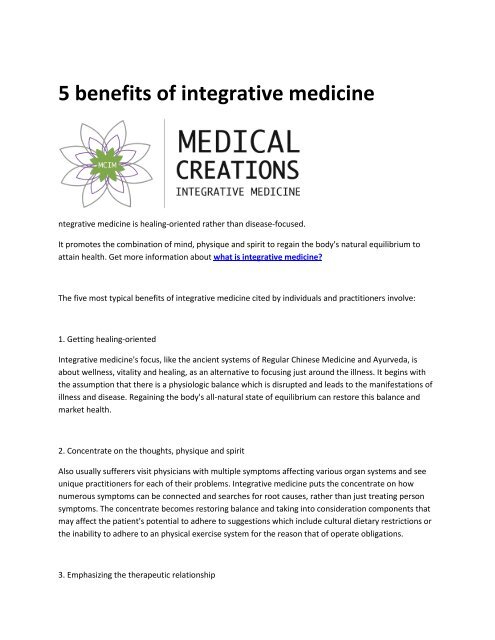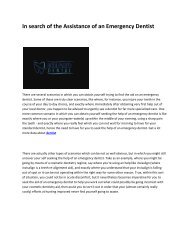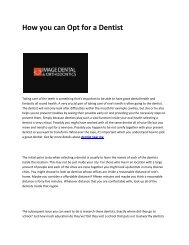5 Functional medicine atlanta
Create successful ePaper yourself
Turn your PDF publications into a flip-book with our unique Google optimized e-Paper software.
5 benefits of integrative <strong>medicine</strong><br />
ntegrative <strong>medicine</strong> is healing-oriented rather than disease-focused.<br />
It promotes the combination of mind, physique and spirit to regain the body's natural equilibrium to<br />
attain health. Get more information about what is integrative <strong>medicine</strong>?<br />
The five most typical benefits of integrative <strong>medicine</strong> cited by individuals and practitioners involve:<br />
1. Getting healing-oriented<br />
Integrative <strong>medicine</strong>'s focus, like the ancient systems of Regular Chinese Medicine and Ayurveda, is<br />
about wellness, vitality and healing, as an alternative to focusing just around the illness. It begins with<br />
the assumption that there is a physiologic balance which is disrupted and leads to the manifestations of<br />
illness and disease. Regaining the body's all-natural state of equilibrium can restore this balance and<br />
market health.<br />
2. Concentrate on the thoughts, physique and spirit<br />
Also usually sufferers visit physicians with multiple symptoms affecting various organ systems and see<br />
unique practitioners for each of their problems. Integrative <strong>medicine</strong> puts the concentrate on how<br />
numerous symptoms can be connected and searches for root causes, rather than just treating person<br />
symptoms. The concentrate becomes restoring balance and taking into consideration components that<br />
may affect the patient's potential to adhere to suggestions which include cultural dietary restrictions or<br />
the inability to adhere to an physical exercise system for the reason that of operate obligations.<br />
3. Emphasizing the therapeutic relationship
There's a new focus on the practitioner-patient partnership forcing us to look at particular inquiries:<br />
How has the clinician's role changed? Are there greater ways to treat health challenges which will only<br />
be managed, not cured? The integrative partnership guides and advises sufferers regarding treatment<br />
options. Collectively, practitioner and patient determine on the very best program of action. Inside the<br />
management of chronic diseases, focus is placed on meeting the patient where they may be in the<br />
moment. By addressing obstacles to way of life alterations and treatment adherence, there is a larger<br />
likelihood of results together with the advisable therapy.<br />
4. Personalized <strong>medicine</strong><br />
Suggestions may differ in integrative treatment plans in line with each and every individual's special<br />
predicament. In tailoring treatment plans to individual demands, practitioners scrutinize the literature<br />
typically using the scientific method to evaluate alternative therapies the identical way as conventional<br />
therapies. Integrative assessments are highly personalized. Patients are asked about almost everything<br />
from environmental exposures to private relationships. All variables are viewed as when figuring out<br />
whether or not or not an individual stays healthier.<br />
5. Using all appropriate therapies<br />
By combining conventional allopathic treatment options together with mind-body therapies, including<br />
yoga and meditation, a treatment plan is created that utilizes the least invasive and most cost-effective<br />
therapies very first. Attaining a sense of "well-being" is specifically important in cases exactly where cure<br />
is not normally achievable. Most integrative providers prescribe treatments amenable to scientific<br />
investigation. However, individuals will not be dissuaded from using particular treatments so long as the<br />
proposed remedies are verified to become secure.

















